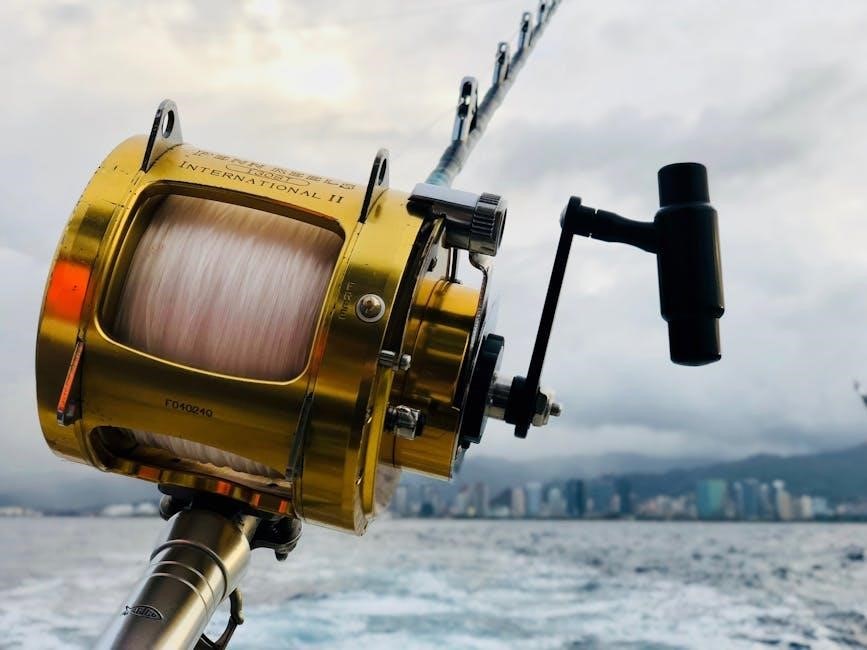A Hawaii Power of Attorney is a legal document allowing individuals to appoint agents to manage financial‚ legal‚ or medical affairs under specific conditions‚ ensuring their interests are protected․

Types of Hawaii Power of Attorney
A Hawaii Power of Attorney comes in various forms‚ including durable‚ general‚ limited‚ and tax-specific options‚ each tailored to grant agents specific authority over financial or legal matters․
Durable Power of Attorney
A Durable Power of Attorney in Hawaii remains effective even if the principal becomes incapacitated‚ ensuring continuous management of financial and legal affairs․ It authorizes an agent to handle transactions‚ such as managing bank accounts or selling property․ This type is ideal for long-term planning and does not expire unless revoked․ The document must be signed by the principal and notarized to be valid․ It provides peace of mind by ensuring decisions are made according to the principal’s wishes‚ even when they cannot act themselves․
General (Non-Durable) Power of Attorney
A General Power of Attorney in Hawaii grants broad authority to an agent to manage the principal’s financial and legal affairs but is non-durable‚ meaning it expires if the principal becomes incapacitated․ It is often used for short-term or specific needs‚ such as managing property or financial transactions․ This type of POA is revocable and must be signed by the principal and notarized to be valid․ It provides flexibility for temporary situations but does not offer long-term protection like a durable POA․
Limited (Special) Power of Attorney
A Limited (Special) Power of Attorney in Hawaii is tailored for specific tasks or situations‚ granting an agent limited authority to act on behalf of the principal․ It is often used for short-term or unique needs‚ such as selling property‚ managing financial accounts‚ or handling legal matters․ This type of POA is revocable and expires once the specified task is completed or the principal becomes incapacitated․ It requires the principal’s signature and notarization to be legally binding‚ ensuring the agent’s authority is restricted to the defined scope․
Tax Power of Attorney (Form N-848)
The Tax Power of Attorney (Form N-848) is a specific legal document in Hawaii that authorizes a designated representative to handle tax-related matters on behalf of the principal․ It is primarily used for managing state tax obligations‚ such as filing returns‚ resolving disputes‚ or signing tax documents․ This form is provided by the Hawaii Department of Taxation and is available for download as a PDF․ It ensures the agent has the authority to act in tax matters‚ making it essential for individuals or businesses needing representation in tax affairs․
Creating a Hawaii Power of Attorney
Creating a Hawaii Power of Attorney involves drafting or obtaining a form‚ appointing an agent‚ and outlining the scope of authority․ Forms are available online as PDFs․
Step-by-Step Process
Creating a Hawaii Power of Attorney begins with obtaining the appropriate form‚ such as the Durable Power of Attorney or General Power of Attorney․ Download the PDF form from official sources or legal websites․ Carefully review the document to understand the powers being granted․ Appoint a trusted agent and outline their authority‚ ensuring clarity on financial‚ legal‚ or medical responsibilities․ Complete the form in black ink‚ sign‚ and have it notarized․ Witnesses may be required in some cases․ Keep a copy for personal records․
Signing and Notarization
Signing and notarization are critical steps to validate a Hawaii Power of Attorney․ The principal must sign the document in the presence of a notary public‚ ensuring the signature is witnessed and authenticated․ This process confirms the principal’s intent and capacity to execute the document․ Witnesses may also be required‚ depending on the form type․ Once notarized‚ the POA becomes legally binding‚ granting the agent authority to act on behalf of the principal․ Photocopies of the signed document carry the same legal weight as the original․

Completing the Hawaii Power of Attorney Form
To complete the Hawaii Power of Attorney form‚ fill in the principal’s and agent’s details‚ specify the powers granted‚ and ensure the document is signed before a notary․
Filling Out the Form
Filling out a Hawaii Power of Attorney form requires careful attention to detail․ Start by entering the principal’s and agent’s full names‚ addresses‚ and dates․ Clearly outline the scope of authority‚ such as financial‚ legal‚ or medical powers․ Specific powers should be detailed‚ and any limitations must be explicitly stated․ Use black ink to sign and date the document․ Ensure all sections are completed accurately to avoid legal issues․ The form must comply with Hawaii’s Uniform Power of Attorney Act․

Execution Process
The execution of a Hawaii Power of Attorney form requires the principal’s signature‚ which must be notarized․ The principal and agent should review the document thoroughly․ Sign in the presence of a notary public to validate the form․ The agent’s responsibilities begin upon the document’s execution unless otherwise specified․ Photocopies of the signed form are legally valid and can be used by the agent to act on the principal’s behalf․ Proper execution ensures the document’s enforceability under Hawaii state law․

Legal Requirements and Considerations
A Hawaii Power of Attorney must comply with state laws‚ including the Uniform Power of Attorney Act․ The principal must have legal capacity to execute the document․
Principal’s Capacity
The principal’s capacity to execute a Hawaii Power of Attorney is a critical legal requirement․ The principal must be at least 18 years old and possess the mental capacity to understand the nature of the document․ This includes being aware of the powers being granted and the implications of appointing an agent․ If the principal lacks mental capacity‚ the document may be deemed invalid․ Capacity is assessed at the time of signing‚ and subsequent incapacity can terminate the POA unless it is durable․ The agent must act in the principal’s best interests․
Role of Notaries

Notaries play a crucial role in the execution of a Hawaii Power of Attorney․ They witness the principal’s signature‚ ensuring the document is signed voluntarily and with full capacity․ The notary verifies the principal’s identity and confirms that they are acting under their own free will․ This step is essential for the legal validity of the POA․ The notary’s seal or stamp adds authenticity to the document‚ protecting it from fraud and ensuring compliance with state laws․ Their involvement guarantees the integrity of the process․
State-Specific Laws
Hawaii’s power of attorney laws are governed by the Uniform Power of Attorney Act under Chapter 551E of the Hawaii Revised Statutes․ This statute outlines the scope of authority granted to agents‚ ensuring clarity and protection for principals․ Specific requirements‚ such as notarization and witness signatures‚ must be met for validity․ Hawaii also recognizes the Tax Power of Attorney (Form N-848) for tax-related matters․ State laws ensure that photocopies of the POA are legally binding‚ provided they are accurate reproductions of the original document․ Compliance with these laws is essential for enforceability․
Post-Execution Considerations
After executing a Hawaii Power of Attorney‚ ensure the document is distributed to relevant parties‚ such as financial institutions and healthcare providers․ Securely store the original and maintain accurate records․
Distribution and Storage
Proper distribution and storage of your Hawaii Power of Attorney are crucial for its effectiveness․ Provide copies to relevant institutions‚ such as banks‚ healthcare providers‚ or legal advisors‚ to ensure seamless execution of your wishes․ Store the original document in a secure location‚ like a safe or safety deposit box‚ to prevent loss or tampering․ Ensure your agent knows where the document is stored and maintain a record of all distributed copies․ This organization ensures accessibility and validity when needed․
Revocation and Amendments
A Hawaii Power of Attorney can be revoked or amended by the principal at any time‚ provided they have legal capacity․ To revoke the document‚ the principal must provide written notice to the agent and any relevant third parties․ Amendments require the same formalities as creating the original document‚ including signing and notarization․ It’s essential to update the document if circumstances change‚ ensuring the agent’s authority aligns with the principal’s wishes․ The principal retains full control over the document’s terms and validity․
Importance of Record-Keeping
Proper record-keeping is essential for maintaining clarity and accountability in a Hawaii Power of Attorney․ The principal and agent should retain copies of the document‚ including any amendments or revocations․ Photocopies of the signed POA carry the same legal weight as the original‚ ensuring accessibility․ Keeping detailed records of actions taken under the POA helps prevent disputes and ensures transparency․ Organized documentation also simplifies audits and provides a clear audit trail‚ protecting both parties’ interests․ Regular updates and secure storage of records are crucial for maintaining the integrity of the agreement․